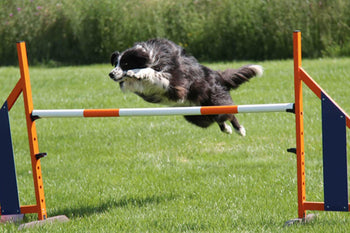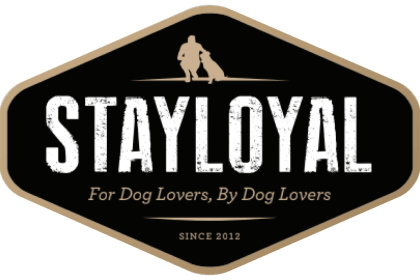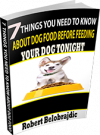Fueling the Canine Athlete

News Flash #1: Dog athletes are not the same as human athletes.
News Flash #2: The differences go beyond the number of legs and amount of hair.
Here’s the big difference when it comes to nutrition for athletes: Because dog muscles have more mitochondria than human muscles they rely more on fat rather than glycogen from carbohydrates for energy. Except during the first minute of exertion, carbohydrates do comparatively little to fuel them.
The importance of carbohydrates versus fat depends on whether your dog does sprint (like racing, coursing, agility or weight-pulling); intermediate (like hunting, tracking or hiking) or endurance (like sled pulling or marathon running) activities.
In general:
- Sprint athletes: High carbohydrate, low fat, moderate protein
- Intermediate athletes: Moderate carbohydrate, moderate to high fat, moderate protein
- Endurance athletes: Low carbohydrate, high fat, moderate protein
Carbohydrates: Carbs can be helpful for sprinters because dogs derive their initial energy from glucose and glycogen. This energy source is quickly used up and then the dog’s body turns to fat, but that takes longer than most sprints to become available. So yes, carbs are good for sprinters. If repeated sprint runs are anticipated, give a high carbohydrate “snack” within 30 minutes after each run to replenish glycogen levels.
Fat: Intermediate and endurance activities are fueled mostly by fat as glycogen reserves are quickly used up. High fat is essential to endurance performance. As exercise duration increases, so should fat content. Fat tastes good and can encourage stressed dogs to eat. Fat supplies more than twice the calories provided by carbohydrates or protein. That’s good for endurance dogs, which could otherwise burn their own muscles for energy once fat stores are used up. But too much fat can cause weight gain and even anemia if fed at the expense of protein for long periods. Look for fat levels between 16% and 20% depending on the type of sport you are doing with your dog.
Protein: Muscles need protein for building and repair. Protein requirement is especially high during the onset of training when muscles are being built. Protein should not be used as an energy source during exercise; it is not readily accessible for energy and its calorie content is not as high as fat. Look for protein levels above 30% to make sure your dog is getting enough amino acids to help rebuild any damaged cells.
Digestibility: Is always important. Highly digestible animal source protein and fats are the most usable for the canine athlete. Fiber can hurt performance by diluting nutrients and adding fecal bulk, adding excess inert weight, plus it can overheat dogs as well. Fiber levels between 1% and 3% are ideal for the canine athlete.
Water: Maintaining hydration is critical for prolonged endurance and thermoregulation. Exercise produces heat, and water is needed to dissipate that heat. Dogs don’t lose as much fluid as humans because they don’t sweat but they do lose fluid through panting. Some dogs are too stressed to drink when at an event, so you must encourage them, whether by adding ice, flavoring or simply removing the dog from excitement.
An interesting fact is that burning fat produces a lot of water which will help endurance athletes maintain hydration longer.
In addition:
- Omega 3 fatty acids: Reduce inflammation after exercise.
- Omega 6 fatty acids: Help red blood cells carry oxygen.
- Vitamin B complex: Helps in production of energy and red cells.
- Vitamins C and E: Counteracts possible cell membrane damage from high intake of fatty acids and increased oxygen metabolism.
Diet changes should start when training starts. It takes four to six weeks for the dog’s body to benefit from any diet alterations, especially from increased fat. Training should begin the same time the performance diet is initiated so the body can utilize the nutrients efficiently. Just as training the day before an event won’t help, neither will feeding a new diet just beforehand help.
Finally, the big day! It takes a dog 20 to 24 hours to completely digest a meal. During that time energy is diverted toward digestion, and undigested food and partially digested fecal matter may still be in the digestive system, compromising performance. I recommend feeding at least 24 hours before competition or even longer. Making sure your dog is empty before it competes. Don’t forget the water—and good luck!








